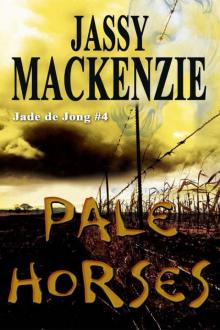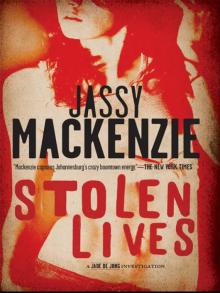- Home
- Jassy Mackenzie
Pale Horses Page 2
Pale Horses Read online
Page 2
‘No, wait. Please listen. I work in a business where my reputation is extremely important. My clients trust me. Being accused of this could ruin me. That’s why I’m asking you, as a favour, to just take a look at where it happened. It’s a five-minute walk from here. We can go there right now.’
3
Victor Theron was a fast walker. His long legs ate up the ground in gargantuan strides, and Jade might have found it difficult to keep up with him had it not been for the crowds of shoppers that thronged the Sandton City mall, their presence curbing his impatient pace and continually forcing him to sidestep.
Hurrying along beside him, Jade was regretting having agreed to look at the site where the accident occurred. Already, she was starting to feel as if she was involved.
Now that he was on the move and able to expend his seemingly boundless energy, Theron seemed more relaxed.
‘You mentioned you were nearby when I called. Are you a Sandton local?’
‘No,’ she replied. Crossing the polished floor of the atrium and moving past the succession of sumptuously decorated shop fronts featuring gold and bling and brand names all screaming for attention, Jade had to admit there wasn’t much here for her. ‘I was visiting a friend in Sandton Clinic this afternoon, though, so I was in the area.’
‘Oh.’ Seeing a small gap ahead, Theron thrust his shoulders forward and made up some distance. ‘Your friend OK?’ he asked, glancing back in her direction.
‘He was a victim of a stabbing a couple of months ago. He almost died and there have been complications since then. But he’s turned the corner now. Doctors are confident he’s going to make a good recovery.’
‘That’s Jo’burg for you,’ Theron muttered. ‘Does he work in the same industry as you?’
‘No. He’s an environmentalist.’
‘Did they manage to arrest the attacker?’
‘Not as far as I know,’ Jade said carefully. After all, it wouldn’t do to confess to Theron that she and Robbie had been responsible for the perpetrator’s disappearance into a shallow, unmarked grave.’
‘Too bad when that happens, isn’t it?’
‘It is indeed,’ Jade said, uncomfortably conscious of the irony of Theron’s remarks.
‘That’s why I like this place.’ Theron made a sweeping gesture with his arm that seemed to take in the entirety of the mall. ‘Security’s topnotch here.’
‘You live here?’
‘Not quite. I have an apartment in the Da Vinci Towers. I can shop, gym, eat, socialise, in fact, do everything I need to do under one roof without having to go outside.’ Theron sounded as if he thought this was a good thing. If nothing else, it explained his pallid colour.
‘I enjoy Sandton City,’ he continued. ‘Do you know, the original development was a massive gamble? This area was way beyond the city limits of the day. This mall and the office tower were built out in the middle of nowhere, surrounded by rural properties and veld and trees.’
‘I didn’t know that,’ Jade said.
‘The founders had foresight. Vision. Although it wasn’t an easy road. I read in a history of Sandton that the father-and-son team who started it came from humble beginnings. The father was originally a baker until he started developing property in Yeoville. He was more of a gentleman developer. His son, Michael Rapp, was the real entrepreneur. When Michael wanted to finance the hundreds of millions it would take to build Sandton City mall and tower, his father went apeshit. Said he’d destroy the company with borrowings on that scale. But Michael got his way and their concept took off, and today Sandton City is the new CBD of Johannesburg. Of Africa, even. I admire that tenacity. Rapp’s gamble. Or should I say, the calculated risk. I do it every day in my job.’
‘Which is?’ Jade was curious now.
The corridor they were on, lined by smaller but even more exclusive boutiques, led to the main entrance of the Sandton Sun hotel. They stepped from tiles onto plush carpeting and Theron led her confidently towards the bank of lifts on the far side of the imposing lobby.
‘Taking a short cut through the hotel is the quickest way to get there,’ he assured her, pressing the button to summon the lift. ‘We’re going down to the street-level exit. Sandton Views is literally a block away.’
In the lift, Jade was interested to see that his nervous habits returned. He twisted his fingers together, tapping a foot on the floor, glancing frequently up at the display as the lift descended.
‘I’m a trader,’ he told her, moving forward to stand in front of the doors as the lift reached its destination. ‘I trade in derivatives. Futures and options. I used to work for one of the bigger banks but I left about fifteen years ago. Since then, I’ve been operating on my own. I trade for myself and I handle investments for a few selected clients.’
‘I don’t know much about futures,’ Jade admitted.
‘Most people don’t. They’re very complex financial structures, based on the forward trading of commodities, and their origins are just about as old as civilisation itself.’
‘Is that so?’
‘Going back in time there’s evidence of futures being traded in olives in Greece, tulips in Holland, rice in Japan. All sorts of things. Futures as we know them today began about a hundred and fifty years ago with grain trading in Chicago. To avoid being caught out by a lack of demand for their produce when it was harvested, farmers started to sell their crops for forward delivery. This concept led to the development of futures.’
‘Sounds complicated,’ Jade said, just as the lift came to a halt.
The uniformed doorman stood aside and they stepped out of the comfortably air-conditioned hotel and into the blustery winter afternoon. They hurried down the uneven pavement, and Theron raised his voice so that Jade could hear him above the constant roar of passing traffic.
‘High risks, high rewards. There’s way more opportunity to make big money than via conventional trading, but because futures are so highly leveraged, if the market moves against you, you have to pay in a fortune to maintain your positions. One bad trade can bankrupt an individual and take a company under. It can basically destroy you.’
He fell silent, as if his own words had reminded him of the situation in which he found himself.
They turned the corner and there, straight ahead of them, was Sandton Views.
The building was a monster.
Set on a paved plinth, wide marble stairs leading up to an imposing lobby, the skyscraper itself was smooth-sided and brilliant and endlessly tall. Behind the plinth, Jade could see the large square of mown lawn where Theron must have landed safely and Sonet plummeted to her death. Shading her eyes as she stared up, Jade had the impression its design narrowed towards its apex, further exaggerating the impression of height. Its glass-clad sides telescoped away from her, the exterior reflecting the deep blue of the clear winter sky.
It was dizzyingly high. Jade’s stomach flipped as she imagined standing on the very edge of that concrete rim with no railing or banister to hold onto. Just the idea of leaning out and looking directly down into the empty space yawning below made her palms sweat.
Jade wondered how well sound would carry downwards.
Had Sonet screamed or cried out during her fatal descent? Perhaps there had been no time; perhaps the speed of the descent had hammered the air from her lungs and rendered her voiceless. Or perhaps her cries had been snatched away by the speed of her fall. While Theron had clearly stated that he’d heard the noise of the parachute, he hadn’t mentioned hearing Sonet’s voice before she hit the ground.
Nevertheless, staring up again at the mirrored glass, Jade was sure of one fact.
If she’d been the one who’d been falling to her death, she certainly would have screamed.
4
The man sitting next to Ntombi Khumalo smelled sour.
She had a keen nose, which meant she caught a whiff of it from time to time, overwhelming the fake pine scent of the air freshener and the fainter but far more expensive smell
of leather. It was the acrid stink of days-old sweat. The odour of a man who had been travelling too long without showering or changing. Beneath his immaculate jacket, she guessed that his grey collared shirt had been soaked in perspiration more than once. Wet, dried, and wet again.
Ntombi didn’t want to think about why. She gripped the steering wheel more firmly and tried to ignore the way her stomach felt; tight and sick with fear.
‘Is the heater on too high for you?’ she asked. She’d rather not have spoken to him at all, but she’d been told to make sure he was comfortable at all times.
He turned to face her. Black skin, deeply tinted glasses, and an expression darker than both. He didn’t answer; just looked at her for a couple of long, cold seconds, as if he were memorising her face for future reference, before giving a small headshake.
Now Ntombi felt sweat spring up under her own armpits. God, she hated doing this. Hated it, and all the more so because now she had no choice.
She inched carefully over the final speed bump on the way out of the airport car park – the one that had little steel blades in it as an extra security measure. Right now they were inside the slits in the raised metal, but she still drove over carefully, in case the blades were accidentally activated, bringing their journey to a disastrous stop with their tyre-shredding sharpness.
But the blades remained out of harm’s way, which Ntombi thought was wrong, because they were designed to stop criminals, and they had just let one pass.
She was familiar with the route they would be taking. She’d studied it yesterday, using a map book she had since closed and put away in door’s side pocket. The car she was driving was equipped with a GPS, but Ntombi knew that it was not to be used for trips such as this, trips where no record could exist. And so the GPS on the dashboard was turned off, its screen blank, an unseeing eye.
On the highway, she took the route to Pretoria. They wouldn’t be going all the way there, they’d switch to the NI highway and turn off at Randburg.
Her passenger shifted in his seat. He wasn’t wearing a seatbelt, and as he took a document out of his inside jacket pocket, she glimpsed an empty leather holster buckled to his belt.
Ntombi’s stomach clenched still further.
She could imagine her employer reassuring him with the words, ‘She’ll be cool. You can trust her one hundred per cent.’
Or perhaps he had laughed and said, ‘Don’t worry – I own her.’ It was a phrase she’d heard him use more than once recently. Certainly he had used it the first time she had chauffeured this dark-skinned man, which had been a week ago now. She hadn’t actually expected to see him again, or at least certainly not so soon.
The man was a killer. That was all she knew; all she needed to know. Her mouth went dry when she realised the implications of this – what it meant for her and her son, affectionately known as Small Khumalo.
She should refuse to do this. But she knew she couldn’t. Not with Small Khumalo now in her sole care. The energetic and gifted young boy was already showing himself to be both an academic whizz and a force to be reckoned with on the soccer field. Thinking of him simultaneously filled her heart with love and with dread.
Small Khumalo had effectively made her a prisoner.
Don’t think of him – not now, she told herself. He was safely at school. A good school – Redhill, in Morningside. A school where she could never have afforded to send him had it not been for her current job.
‘Can you really drive?’ her prospective employer had asked, his tone one of amusement, when he had first interviewed her. ‘You come from a small rural community. Not many people from those parts of South Africa have an education, never mind a driver’s licence.’
‘The school I attended in Bronkhorstspruit was a rural school, but a good one. I passed my Matric with a distinction in Housecrafts,’ she had told him, raising her chin to display a confidence she did not feel. ‘My husband owned a car for a while. He taught me how to drive, and in that very car I obtained my licence.’
‘Well, I need a housekeeper who can cook, because I’m too busy to make my own meals. Your main job will be to keep my place in order and the fridge well stocked with food. As far as driving goes …’ At this, he’d looked thoughtful. ‘It’s certainly something I could make use of in the future. But tell me, why did you decide to leave your community and come to work in Johannesburg?’
Don’t think of that fateful interview now. Think of food instead. Her employer’s fridge was currently full, but she needed to cook for herself and her son. What should she make for dinner tonight?
Driving along the R21, keeping just within the speed limit, Ntombi forced her thoughts to her greatest passion in life apart from her son – her cookery. The kitchen in her furnished apartment was small, but it was well equipped, with multiple electronic gadgets and tools, expensive pots and pans, a whole cupboard full of recipe books, and her greatest joy – a state-of-the-art Kenwood food processor.
She’d make bobotie, she decided. A traditional Cape Malay dish, perfect for a winter evening, with spiced mince and raisins topped with an egg custard and oven-baked for an hour to bring it to sizzling golden-brown perfection. This would be accompanied by saffron rice and a simple but tasty salad. Sliced avocado – there were some beautiful ones in the kitchen that had ripened to perfection – with wild rocket, chopped cucumber and crumbled Danish feta.
She could already visualise arranging the ingredients in shallow bowl, creating a pyramid with the avocado and chunks of cucumber. A good dressing – a balsamic reduction would work perfectly – with perhaps a few homemade croutons to top it off.
Ntombi’s fierce grip on the steering wheel started to relax as she planned her menu. But when she realised cars in front of her were slowing, the two lanes narrowing into one, and she saw the orange cones that signalled a police roadblock they tightened again.
Her heart started to pound fast and hard.
Her undesirable companion put the piece of paper back into his jacket pocket and fastened it, concealing the holster, before doing up his seatbelt and leaning back in his seat, eyes closed.
Let her get through this. It was bound to be a routine stop, with the police checking for valid driver’s licences and registration. Surely they hadn’t had a tip-off about the man she’d picked up at the airport barely fifteen minutes ago?
Stop it, Ntombi told herself. You can do this. The only thing that will give you away is your own fear.
An officer waved her over and she pulled into the emergency lane, the tyres bumping gently over an uneven patch in the tarmac. She buzzed the window down.
The black policeman bent down and peered into the vehicle’s plush interior.
‘Licence, please,’ he said, and although Ntombi could hear from his accent that he was Xhosa, he spoke to her in English.
She handed over the licence card that stated she was Mrs Thabiseng.
‘You coming from the airport?’ the cop asked. She got the distinct feeling that this was not just making conversation; that they were on the lookout for something.
‘Yes,’ she told him, and to her immense relief her voice sounded steady. ‘I picked up my husband from international arrivals earlier this morning.’ She inclined her head to her left. ‘Please don’t speak too loudly,’ she asked the cop, giving him one of her most vivacious smiles. ‘We might disturb his sleep. I think he enjoyed too many single malts in business class.’
The cop grinned. He gave her back her licence, walked around the front of the car, and peered in through the windscreen as he read the licence disc.
‘You can go,’ he said, waving her on.
Ntombi let out a long, shaky breath of relief as she rejoined the highway.
Whatever or whoever the cops had been looking for, it was not a newly rich black couple on their way home from the airport. A wealthy husband and wife, such as they appeared to be, and no doubt as well connected as they were well dressed put them instantly beyond suspicion.
&nb
sp; Which was why her employer had ordered her to drive this client of his when he was in town.
Putting her foot down harder, Ntombi accelerated up to the speed limit, hoping that the dark-suited man wouldn’t be spending too much time in Jo’burg afterwards; that in fact her next journey might be to take him back to the airport.
At any rate, she prayed so.
5
To Jade’s surprise, Theron didn’t walk straight up to the entrance of Sandton Views. Instead, he pointed across the street to what she saw was a rather odd-looking, tall, cylindrical bronze monument with carvings covering its surface.
‘Before we go any further, I have to show you something. That’s the Candle of Hope,’ he said. ‘I come here sometimes just to stand and look at it. I don’t know if you know anything about it. Do you?’
Jade shook her head.
‘It was commissioned by a developer called Dorrestein. He heads up the Legacy group, which built Da Vinci Towers. He had it put up a couple of years back after his son was killed in an attempted hijacking. They call it a candle, but it’s supposed to be modelled on a fig tree. The scenes on it are beautiful, if you look up close. So many important moments in South Africa’s history.’
‘I never even knew it existed,’ Jade confessed.
‘That tall glass wall behind it is covered with etchings of trees and inspirational sayings. And below the wall is a well of water. That’s supposed to be where the tears of those who have suffered and lost are collected.’
‘That’s amazing,’ Jade said, genuinely surprised. She’d driven through that intersection several times in the past couple of years and had never noticed the monument until now. ‘I’ll have a closer look at it on the way back.’
‘You want to go into Sandton Views, while we’re here?’
They turned away from the Candle of Hope and took in the far more imposing structure ahead of them. Sandton City’s tallest building. For a few years at least, it would dominate the CBD’s skyline.

 Pale Horses
Pale Horses Bad Seeds
Bad Seeds Random Violence
Random Violence Folly
Folly Stolen Lives
Stolen Lives The Fallen
The Fallen Soaring
Soaring Drowning
Drowning